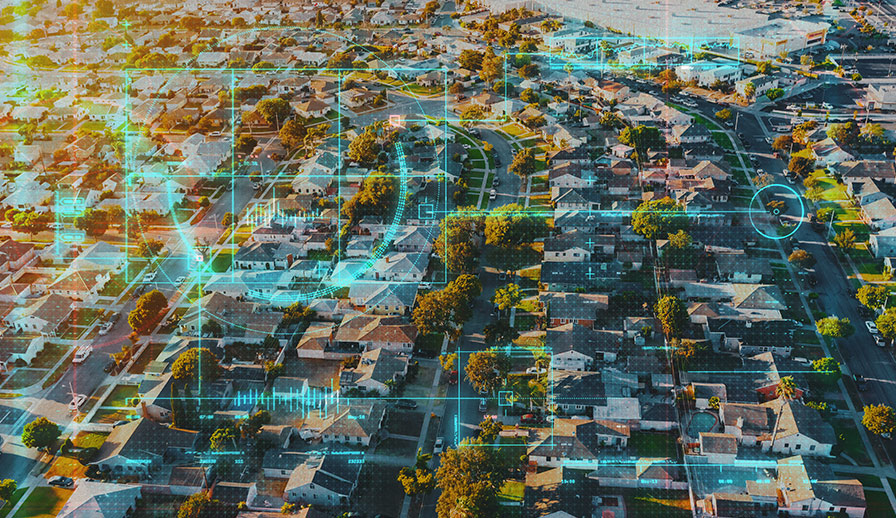Artificial intelligence (AI) has been the buzzword in several businesses for years. Some take it with a grain of salt, while others are motivated to implement more of it in their businesses. The real estate industry has been no exception to this, and we can see already how machine learning and AI are already improving real estate technology.
The year 2020 has pushed this dynamic even further. Now more than ever, real estate businesses are doing their job online. The switch to an online world calls for new technologies with better tracking and monitoring capabilities.
One of the most interesting aspects of artificial intelligence in the real estate industry is visual AI. The applications of visual AI in the real estate industry are endless, and we’ll review some of them here. Most importantly, we’ll focus on the role AI plays in a post-pandemic real estate world, where so many business criteria have changed.

The most important function of AI in real estate is in the construction sphere. Here are a few examples:
Design and safety
Real estate construction has been evolving for thousands of years. However, there’s always room for errors. Some of these errors can cost billions of dollars or even the loss of life. AI can help lower the chance of mistakes through 3D modeling and more accurate designs.
Also, on-site safety can be improved through visual and audio AI. Construction sites are often places with a lot of heavy machinery and human labour involved. Better monitoring facilities, powered by AI, can help manage the complexity of huge construction projects and keep workers safe.
Efficiency
Construction can be very costly because it entails a lot of procedures and materials. AI can dramatically lower the costs by turning big data into understandable figures and simplifying purchasing decisions for developers.
Environment
Climate change is a major concern for most governments and businesses. Controlling energy use and emissions is an important aspect in the development of a property and also in the way future residents will use it.
Artificial intelligence helps protect the environment by:
- helping to evaluate and identify environmentally friendly materials;
- helping make energy conservation decisions;
- developing a smarter and more energy-efficient home through IoT (Internet of Things);
- identifying ways to implement alternative (cleaner) energy resources in future homes; and
- a lot more!

How can AI transform real estate after the pandemic?
AI has the potential to revolutionize the real estate industry in the upcoming years. Real estate has not always been the fastest industry to take up new technology. However, adaptation is inevitable, and AI is growing rapidly.
The following are a few examples of how AI can help real estate professionals do better business:
Lead generation
Real estate websites are working closely with social media platforms to improve lead generation capabilities. AI can help speed this up by:
- analyzing user data quickly to help marketing campaigns;
- turning user interactions into marketing reports;
- helping real estate marketers get better information on their target audience; and
- helping agents cover more leads and clients through chatbots and smart assistants.
Market prediction
With markets growing rapidly and data becoming abundant, real estate professionals can use AI to identify market trends and make better business decisions. This will help them to not only limit damages in the event of a market downturn but also maximize profits during an upswing.
Property analysis
One of the most interesting applications of AI in real estate is undoubtedly property analysis. This is most practical to real estate investors who need a better understanding of their properties and the way they appreciate/depreciate. This can help them manage future down payments and loans more effectively and increase their profits.
Property recommendations
Machine learning can now help find the best match for a client. The real estate agent doesn’t have to go back and forth having multiple meetings with the client in order to find the best match.
Property management
It often takes a lot of time and labour to monitor a property. AI can improve this by providing better monitoring and tracking systems, so fewer people need to be involved with property management, which is indeed a massive issue for big complexes and estates.
Visual AI vs. audio AI in real estate
Visual AI and audio AI are tools helping experts and novices to communicate data through the means of imagery and sound. These have several applications in medicine and defense, but the modeling strategies can also be used in real estate.

Bottom line
AI has been in the game for ages. However, little practical attention has been given to it, and some technology experts have been slow to acknowledge its power.
Nevertheless, times are changing, and the events of 2020 have proved to all of us we need to adapt to change, and we need to do that fast. AI can be an effective solution in the campaign against time.
Staying on top of the game when it comes to real estate technology can be the best approach for a successful real estate business in a post-pandemic world.





Love this article, I am a broker and I am currently building an AI powered platform to help investors with market predictions, property analysis and eventually recommend them properties. This article is on point and all these trends are happening now: Exiting
Thanks Uriel, times are changing! If we learned one lesson from last year, that would be adoption before the circumstances force us. Early birds will always catch the worms.